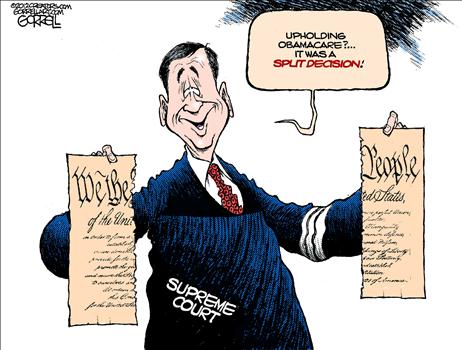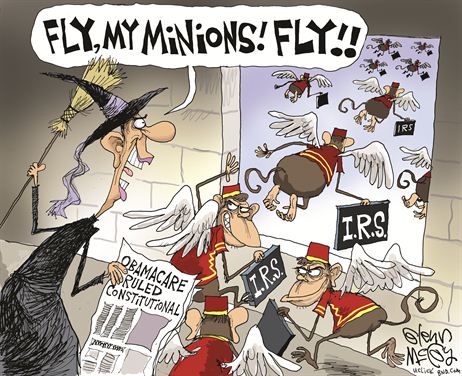Four justices got it right yesterday. Unfortunately, five got it wrong. The most painful part of the divide is that Chief Justice John Roberts led the charge for upholding the clearly unconstitutional Obamacare. Wait a minute, you say, how can I call it unconstitutional when the Supreme Court has declared otherwise. Because it is. The four justices who wrote in dissent, with Anthony Kennedy surprisingly in agreement, declared that the entire law should be thrown out because of its blatant unconstitutionality. Those judges understand the original wording and original intent of the Constitution.
This 5-4 vote would have gone the other way without the disappointing defection of Roberts. There has been speculation—and that’s all it can be at this point—that he was swayed by the White House attack on the integrity of the Court, and that he somehow thought by going in this direction, he was upholding the Court’s image. I don’t know if that is true. I won’t say it is; neither am I going to launch a personal attack on his character. What he has done, though, is deal a blow to the rule of law, which is always one of my main concerns.
Conservative commentators, looking for whatever silver linings they can find, have come up with at least one. Since the Court rejected Obama’s rationale for the law, they say that’s a win. Obama sold this monstrosity as being valid under the Commerce Clause of the Constitution. The majority said that was untenable, thereby hopefully curtailing future attempts to use that clause to do anything the government would like to do. So yes, that is a positive. But it’s the proverbial double-edged sword. Justice Roberts instead called it acceptable as part of the taxing power of the Congress, so now all we have to worry about is IRS enforcement:
If that doesn’t give you the warm fuzzies, you’re not alone.
When the president was “selling” this package at the beginning, he was adamant it was not a tax. He knew the American people would recoil at that. There’s a key interview he did with George Stephanopoulos back in 2009 that’s making the rounds again on the internet. In that interview, Obama absolutely claimed it wasn’t a tax. Yet when his people made their arguments before the Court, they tried to peddle it as a tax there, which reveals the hypocrisy and cynicism behind the law. This time they won a convert in Justice Roberts.
Here’s where I’m going to offer an argument that I saw only one writer even mention yesterday: the Court got it wrong on the power to tax. Although most of the negative comments about the ruling talked about the fear of greater taxation, they weren’t based on the Constitution’s enumerated powers. Rather, they went along with the idea that Congress has the authority to tax whatever it chooses. Wrong. The enumerated powers in Article I are there to limit the areas in which Congress can legislate and collect taxes. I challenge anyone to find a provision for legislating and collecting taxes for healthcare.
Of course, this is nothing new. Ever since the 1937 Helvering case, which declared Social Security constitutional, Congress has acted with little restraint at all. That case essentially said the enumerated powers don’t really exist—they’re just examples of the virtually unlimited power of Congress to legislate as it sees fit. Roberts should know better. I believe he has some background with the Federalist Society, an organization of lawyers and other political types who are trying to revive the concepts of constitutionalism and federalism.
Yesterday’s decision does tremendous damage to the future of freedom in this nation:
This brings me to another silver lining, though. When freedom is threatened, people awake and rise up to defend their freedom. Already this awful ruling has awakened a sleeping giant. The Romney campaign, in the hours just after the decision was made public, received an immediate influx of cash—the last I heard the amount was close to $2 million. And that was without any prodding, except for the Court’s ruling. Tea Party faithful are already organizing; the Republican Governor’s Association has declared that Republican governors are not going to go along with this ruling until they see what happens in November. Now that Obamacare has been called a tax by the highest court in the land, it has become the largest tax increase in American history. Somehow, the president has to defend that after famously claiming that no one, under his administration, making less than $250,000 per year would see their taxes raised.
One comment Roberts made in his ruling was quite accurate. He said the Court’s job is not to protect the people from the political decisions they make. By choosing Obama, the people brought this on themselves. They have no one to blame but themselves. But the nice thing is that they can change their minds. Just because the Supreme Court wrongly issued a decision saying Obamacare is constitutional, that doesn’t mean we have to live with it. Obamacare is the creation of Congress, and a new Congress can repeal it. In fact, the House has already scheduled a vote on that very thing after the Fourth of July. It will pass, and then die in the Democrat Senate. It will be symbolic, but it also may be a harbinger of what will happen if the Republicans can recapture the Senate and the presidency.
Back in 1857, the Supreme Court said that no black person was a citizen of the United States. It was wrong, and a Civil War corrected that wrong decision. In 1896, it declared the doctrine of separate-but-equal to be valid in racial matters. The nation eventually rejected that rationale as well. There is hope that yesterday’s abominable decision will also be cast into the dustbin of foolish Supreme Court pronouncements.
But it depends on the intelligence and vigilance of the electorate. How determined are we to protect our liberty?




